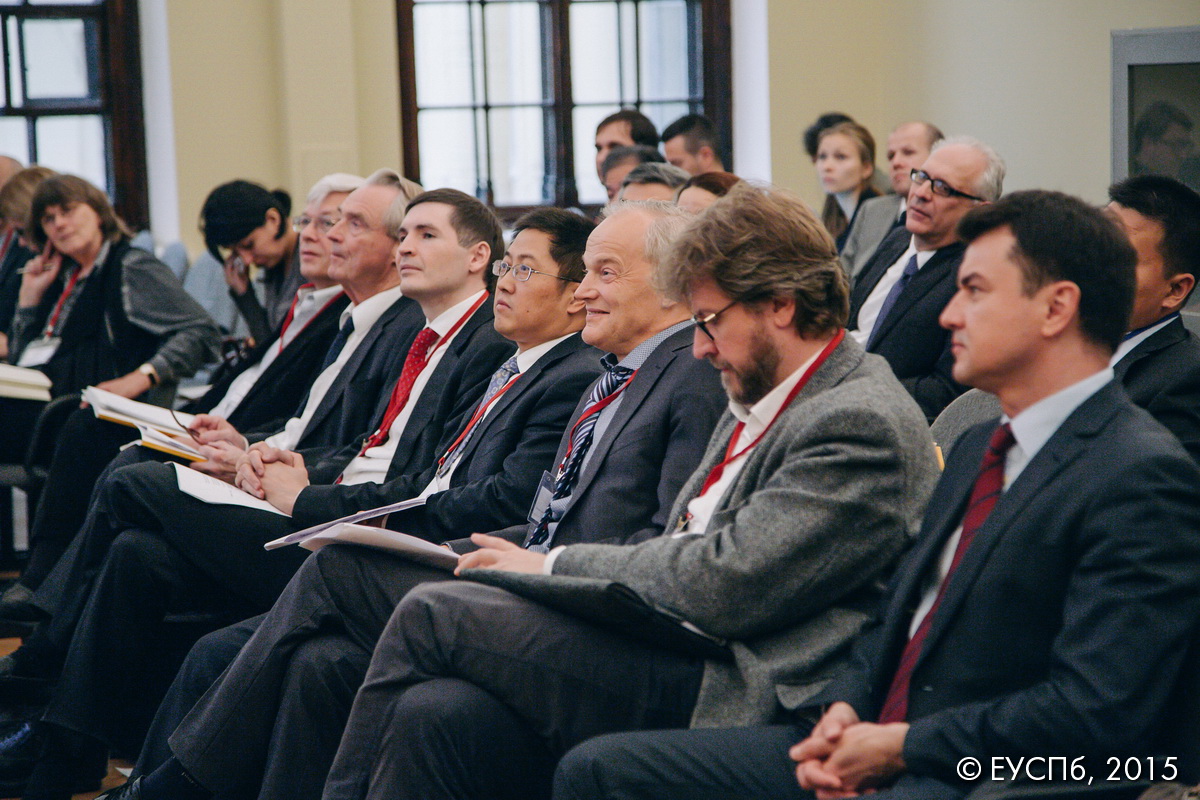Russia in Changing Global Markets: New Challenges and Opportunities
International Summit
Saint Petersburg, Russia, 2-3 October 2015
By Irina Mironova and Michael Roh
On October 2-3, the International Energy Center at the European University at Saint Petersburg held an International Summit “Russia in Changing Global Markets: New Challenges and Opportunities”. Representatives of international energy expert circles, policy makers, as well as industry representatives gathered at the EUSP to share their views on Russia’s position in the international energy markets, which are going through a fundamental change.
Below we present the main statements from the conference’s experts divided into three categories: Russia’s energy future, the impact of sanctions, and Asian energy.
We do not disclose any names in this report since the Summit was held under the Chatham House rules.
RUSSIA’S ENERGY FUTURE
Background: The Russian economic situation can be characterized as cautiously pessimistic, the economic development prospects are not very positive. As it stands today, the Rouble is weak, prices inside Russia are increasing, and the oil price stays at the level, which is not favourable for the Russian budget dependent on oil export income. The economic development of the country depends on the prospects for the energy sector.
Broadly speaking, the Russian energy sector faces two groups of challenges – external and internal. External challenges include changes in the international energy markets: the already mentioned low energy prices, stagnant demand and the resulting oversupply. Internal challenges include Russia’s overall dependence on incomes from energy resources export, and ineffective tax system. Good news is that hydrocarbons will still be used for the next several decades on a large scale worldwide, while the Middle East – region supplying large shares of world’s oil and gas – is unstable and another group after ISIS is likely to emerge to become a new rogue threat. So Russia does have a chance to preserve its share in world oil and gas markets. The question is how to use that chance and effectively cope with challenges.
The key messages / recommendations from the participants of the Summit:
- The Russian energy sector could focus on shale technology, Arctic exploration, and resources in East Siberia, which would help to develop domestic technology and create jobs.
- Russia needs to completely restructure its economic approach if it wants to develop its shale industry.
- Russia should look at countries like Iceland and Venezuela, who have taken advantage of their natural resources in a different way, focusing on exports derived from these resources.
- Russia needs to focus on the upstream oil sector (exploration, production), and restructure its current tax system.
- The Lena delta is an area with potential, but it lacks infrastructure and is not really explored.
SANCTIONS
Background: Throughout 2014, there have been several packages of sanctions introduced by the EU and the US. There are restrictions on financing and supplies of equipment and technology. New technologically complex upstream projects experience largest hit from the sanctions regime (through limited access to financing and technology), while those are the ones that are critical for sustaining Russia’s future production. The Russian energy companies affected by the sanctions can generally be split into three groups. Firstly, Gazprom and Novatek have avoided direct sanctions of the EU (as generally perceived, largely due to the fact that the EU is dependent on Russian gas supplies) – but the US sanctions do cover these two companies. Secondly, Lukoil and Surgutneftegaz are covered only by the technology transfer sanctions within the US package – financial restrictions do not cover these two. And finally, the third group includes Rosneft, Gazprom-Neft, and Transneft, who are subject to a full range of sanctions by both the US and the EU.
The key messages / recommendations from the participants of the Summit:
- US and EU sanctions are delaying exploration projects, particularly the Arctic.
- The sanctions have an impact on Russia’s relations with countries that are not even part of the sanctions regime, including South Korea and Japan. The latter are hesitant to lend technology, because they must be mindful of their own relations with the West. Thus, these economic links are definitely impacted by geopolitics.
- The written sanctions have very unclear wording. For example, the term “financial assistance” is a broad term that is creating confusion for banks that are hesitant to fund exploration projects.
- The sanctions are not hurting Russia particularly at the moment, since shale and projects in the Arctic are not huge shares of the Russian economy, but will certainly affect Russia in the long term.
- Sanctions hurt the West too, since Western banks are missing opportunities to invest in Russia.
- The sanctions are great for China, since the long-running negotiations between Russia and China, which have not made much progress, are affecting the balance of negotiating power in favour of China. Russia has less alternative options, hence its weaker negotiation position.
- Sanctions have an unseen benefit, as they may push policymakers to address the current ineffective strategy of import substitution.
- With the sanctions in place, countries like Israel, Algeria, Libya, and the U.S. could become more competitive gas suppliers to the EU.
- There is disagreement between experts on whether Turkish stream is mutually beneficial for Russia and Turkey, or whether this will increase Turkey’s dependence on Russia.
ASIAN ENERGY MARKETS
Background: The geography of world energy trade has been chancing over the past decade shifting more and more supplies to the Asia Pacific. There are increasingly important players such as China and India, but also traditional heavyweights in oil and LNG trade flows – Japan and South Korea. The construction of the first line of ESPO pipeline was completed in 2009. This allowed Asian importers to pursue their policies of oil import diversification. Russia has marked its factual turn to the Asian gas market by signing a gas supply contract with China in May 2014. There is also a framework agreement on supplies via the Altai pipeline (the Western route), which could create competition for gas supplies between China and the EU, providing Russia with the role of an arbitrageur.
The key messages / recommendations from the participants of the Summit:
- The Power of Siberia line will be up and running by year 2018, delivering gas from Russia’s Far East to East Asia. East Siberian oil is attractive because it’s good quality, it’s onshore (carrying less risk and cost), and it’s close to China, South Korea and Japan who all have substantial demand.
- Russia’s increasing market share of Japan’s crude oil imports means Japan is moving away from the Middle East.
- China consumes so much coal, its shift from LNG would be a “win-win” for everyone and a victory for the global environment.
- A Russia-ROK pipeline: South Korean leadership is making a mistake, with former President Lee Myungbak attempting to use a gas pipeline as a political tool for its motivations against North Korea, and current President Park Geunhye stating no interest in pursuing a pipeline at all.
- Gazprom isn’t attracted to pursue a pipeline to Japan because it perceives Japan as having a lack of “unity” in that domestic actors want different things.
- China, South Korea, and Japan need to unite in their LNG ambitions, because it would be mutually beneficial to cooperate but they would need to be flexible and transparent. However, geopolitics and historical distrust will probably hinder this level of cooperation.
Irina Mironova is Senior Lecturer at Energy Politics in Eurasia Master Program, and the Editor-in-Chief of ENERPO Journal and ENERPO Newsletter. She can be contacted at imironova@eu.spb.ru.
Michael Roh is an ENERPO student. Michael has previously studied political science at City University of New York, Hunter College. He can be contacted at mroh@eu.spb.ru.
Do not forget to visit ENERPO pages:
| ENERPO Twitter account | https://twitter.com/ENERPO_EUSP |
| Workshop Series videos | http://www.youtube.com/user/EUSPchannel |
| ENERPO journal | http://eu.spb.ru/en/international-programs/enerpo/enerpo-journal |
| International Energy Center at EUSP | http://eu.spb.ru/en/international-programs/enerpo/international-energy-center |



